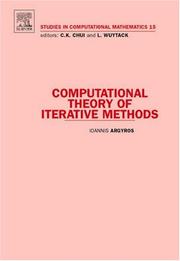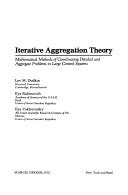| Listing 1 - 10 of 47 | << page >> |
Sort by
|

ISBN: 1281189189 9786611189181 0080560709 0444531629 9780444531629 9780080560700 9781281189189 6611189181 Year: 2007 Volume: 15 Publisher: Amsterdam ; London : Elsevier,
Abstract | Keywords | Export | Availability | Bookmark
 Loading...
Loading...Choose an application
- Reference Manager
- EndNote
- RefWorks (Direct export to RefWorks)
The book is designed for researchers, students and practitioners interested in using fast and efficient iterative methods to approximate solutions of nonlinear equations. The following four major problems are addressed. Problem 1: Show that the iterates are well defined. Problem 2: concerns the convergence of the sequences generated by a process and the question of whether the limit points are, in fact solutions of the equation. Problem 3: concerns the economy of the entire operations. Problem 4: concerns with how to best choose a method, algorithm or software program to solve a specific type
Funktionalanalysis. --- Iteration. --- Iterative methods (Mathematics). --- Lehrbuch. --- Numerische Mathematik. --- Iterative methods (Mathematics) --- Engineering & Applied Sciences --- Applied Mathematics --- Numerical analysis. --- Mathematical analysis --- Iteration (Mathematics) --- Numerical analysis
Book
ISBN: 9780521189439 9781107007512 0521189438 1107007518 9780511977152 9781139081078 1139081071 9781139078801 1139078801 0511977158 9781283111164 1283111160 1107221773 9786613111166 1139076523 1139083341 1139070800 9781107221772 6613111163 9781139076524 9781139083348 9781139070805 Year: 2011 Publisher: Cambridge : Cambridge University Press,
Abstract | Keywords | Export | Availability | Bookmark
 Loading...
Loading...Choose an application
- Reference Manager
- EndNote
- RefWorks (Direct export to RefWorks)
With the advent of approximation algorithms for NP-hard combinatorial optimization problems, several techniques from exact optimization such as the primal-dual method have proven their staying power and versatility. This book describes a simple and powerful method that is iterative in essence and similarly useful in a variety of settings for exact and approximate optimization. The authors highlight the commonality and uses of this method to prove a variety of classical polyhedral results on matchings, trees, matroids and flows. The presentation style is elementary enough to be accessible to anyone with exposure to basic linear algebra and graph theory, making the book suitable for introductory courses in combinatorial optimization at the upper undergraduate and beginning graduate levels. Discussions of advanced applications illustrate their potential for future application in research in approximation algorithms.
Iterative methods (Mathematics) --- Combinatorial optimization --- Itération (Mathématiques) --- Optimisation combinatoire --- Combinatorial optimization. --- Optimization, Combinatorial --- Combinatorial analysis --- Mathematical optimization --- Iteration (Mathematics) --- Numerical analysis --- Iterative methods (Mathematics).
Book
ISBN: 1634854225 9781634854061 1634854063 9781634858793 1634858794 9781634854221 Year: 2017 Publisher: New York : Nova Publishers,
Abstract | Keywords | Export | Availability | Bookmark
 Loading...
Loading...Choose an application
- Reference Manager
- EndNote
- RefWorks (Direct export to RefWorks)
Iterative methods (Mathematics) --- Algorithms. --- Numerical analysis. --- Mathematical analysis --- Algorism --- Algebra --- Arithmetic --- Iteration (Mathematics) --- Numerical analysis --- Foundations
Book
ISBN: 1634858964 9781634858960 9781634858793 Year: 2017 Publisher: New York : Nova Publishers,
Abstract | Keywords | Export | Availability | Bookmark
 Loading...
Loading...Choose an application
- Reference Manager
- EndNote
- RefWorks (Direct export to RefWorks)
Iterative methods (Mathematics) --- Algorithms. --- Numerical analysis. --- Mathematical analysis --- Algorism --- Algebra --- Arithmetic --- Iteration (Mathematics) --- Numerical analysis --- Foundations
Book
ISBN: 9780128094938 0128094931 9780128092149 0128092149 Year: 2018 Publisher: London : Academic Press,
Abstract | Keywords | Export | Availability | Bookmark
 Loading...
Loading...Choose an application
- Reference Manager
- EndNote
- RefWorks (Direct export to RefWorks)
Iterative methods (Mathematics) --- Numerical analysis. --- Mathematical analysis --- Iteration (Mathematics) --- Numerical analysis
Book
ISBN: 9783031044205 Year: 2022 Publisher: Cham Springer International Publishing :Imprint: Springer
Abstract | Keywords | Export | Availability | Bookmark
 Loading...
Loading...Choose an application
- Reference Manager
- EndNote
- RefWorks (Direct export to RefWorks)
Book
ISBN: 9783031633614 303163361X Year: 2024 Publisher: Cham Springer Nature Switzerland :Imprint: Springer
Abstract | Keywords | Export | Availability | Bookmark
 Loading...
Loading...Choose an application
- Reference Manager
- EndNote
- RefWorks (Direct export to RefWorks)
This comprehensive book delves into the intricacies of Newton-type methods for nonlinear equations, offering insights into their convergence, accelerations, and extensions. Divided into three parts, the book explores higher-order iterations for nonlinear equations and their systems, and their applications in linear algebra and some nonlinear problems of theoretical physics. Emphasizing the pivotal role of iteration parameters in shaping convergence and expanding the domain, the authors draw from their extensive collaborative research to systematically compile and elucidate these findings. Catering to readers, graduate students, and researchers in applied mathematics, numerical analysis, and related disciplines, this book serves as a valuable resource, synthesizing decades of research to advance understanding and practical application in the field.

ISBN: 0824775708 9780824775704 Year: 1987 Volume: 111 Publisher: New York (N.Y.): Dekker,
Abstract | Keywords | Export | Availability | Bookmark
 Loading...
Loading...Choose an application
- Reference Manager
- EndNote
- RefWorks (Direct export to RefWorks)
Book
ISBN: 1282187953 9786612187957 3110218194 9783110218190 3110218186 9783110218183 9781282187955 9783110218183 6612187956 Year: 2009 Publisher: Berlin ; New York : W. de Gruyter,
Abstract | Keywords | Export | Availability | Bookmark
 Loading...
Loading...Choose an application
- Reference Manager
- EndNote
- RefWorks (Direct export to RefWorks)
This book, written by two experts in the field, deals with classes of iterative methods for the approximate solution of fixed points equations for operators satisfying a special contractivity condition, the Fejér property. The book is elementary, self-contained and uses methods from functional analysis, with a special focus on the construction of iterative schemes. Applications to parallelization, randomization and linear programming are also considered.
Iterative methods (Mathematics) --- Numerical analysis. --- Mathematical analysis --- Iteration (Mathematics) --- Numerical analysis --- Ill-posed Problems. --- Iteration Method. --- Noisy Data. --- Nonlinear Equations. --- Optimization.
Book
ISBN: 9783030931582 Year: 2022 Publisher: Cham Springer International Publishing :Imprint: Springer
Abstract | Keywords | Export | Availability | Bookmark
 Loading...
Loading...Choose an application
- Reference Manager
- EndNote
- RefWorks (Direct export to RefWorks)
| Listing 1 - 10 of 47 | << page >> |
Sort by
|

 Search
Search Feedback
Feedback About UniCat
About UniCat  Help
Help News
News